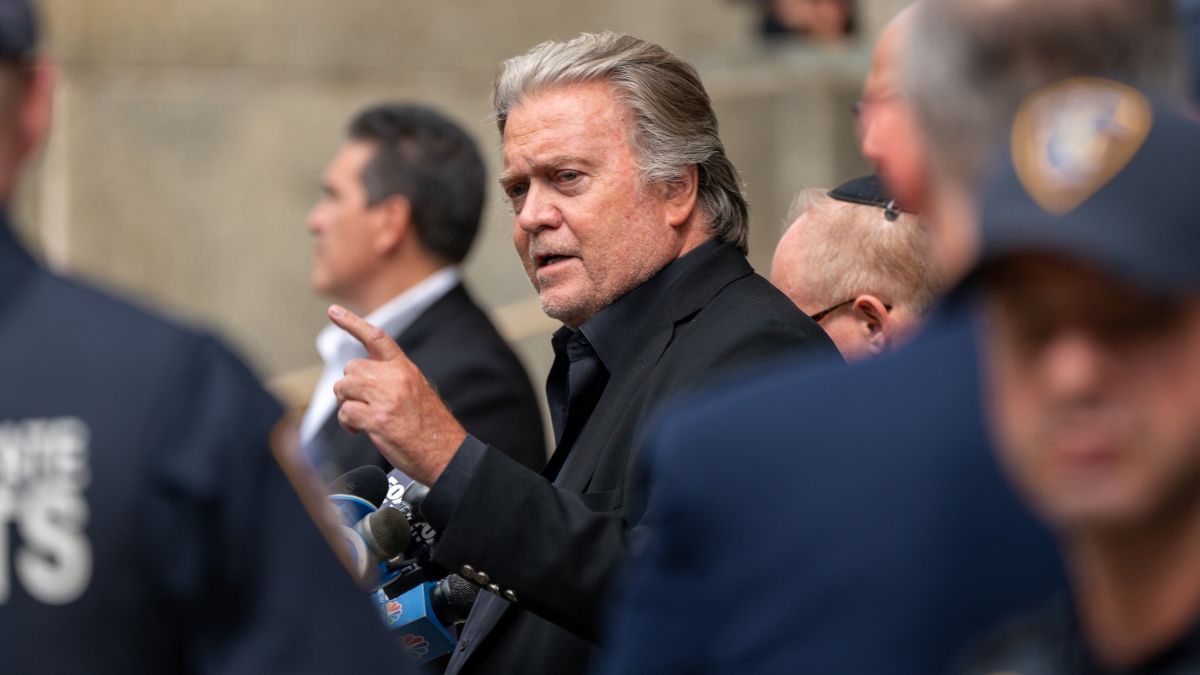(Trends Wide) –– Steve Bannon, Trump’s former adviser, received a sentence of 4 months in prison on Friday for contempt of Congress. Judge Carl Nichols, appointed by Trump, determined that Bannon would serve that sentence for each of the two counts against him, albeit simultaneously. However, Nichols clarified that the former adviser will not go to jail until an appeal from his lawyers is resolved.
Bannon must also pay a $6,500 fine, the court ruled.
Before sentencing, Bannon told the judge he did not wish to speak during the hearing: “My attorneys have spoken for me, Your Honor.” However, as he left court he briefly addressed the media and assured that this was his sentencing day, but that the Democrats will have their own in the midterm elections in November.
“I respect the judge, the sentence he issued, I have been totally respectful throughout this process in the legal aspect,” he said. “Today was my sentencing day by the judge. And he mentioned appeal, and we’re going to have a vigorous appeal process,” he continued. On November 8, (there will be) a trial of the illegitimate Biden regime…and, frankly, Nancy Pelosi and the entire (January 6 House) committee “will be tried, he added.

Steve Bannon in July, the day before he was found guilty of contempt. (Anna Moneymaker/Getty Images)
What’s next now? According to the judge, the former Trump adviser has 14 days to file an appeal. If he doesn’t, he must take steps to voluntarily surrender by Nov. 15, he said. However, Bannon’s lawyers have already made it clear that they plan to appeal the sentence: “We certainly fully respect the judge’s decision. But we will file a notice of appeal as directed,” David Schoen, an attorney for Bannon, said Friday. “I’ve said it before and I would confirm it, I think the appeal in this case is bulletproof,” he insisted.
At the start of the hearing, Nichols said that Bannon “has shown no remorse” for his actions. To which his lawyers responded that the former adviser “should not apologize” because “there is nothing to punish here.” So Schoen, Bannon’s defender, argued that his client was defending American values and government institutions, including the White House.
This ruling represents a milestone in the Justice Department’s response to the January 6 insurrection at the US Capitol. The case against Bannon stemmed from his refusal to comply with a subpoena from the House committee investigating those events. In that sense, the prosecutors pointed out that by “disobeying” the Bannon summons “exacerbated” the attack on the rule of law that represented the insurrection in the country’s capital.
Prosecutors recommendation.
Federal prosecutors on Monday recommended a six-month prison sentence for Bannon “for his sustained and bad faith contempt of Congress.” They also asked for a fine of US$200,000.
According to prosecutors, Bannon did not fully comply with the probation office in his pre-sentence investigation, writing that the former adviser “freely answered questions about his family, professional life, personal background, and health. But the defendant refused to disclose his financial records, insisting instead that he is willing and able to pay any fine imposed, including the maximum fine for each conviction count.”
They added: “The rioters who invaded the Capitol on January 6 did not just attack a building, they attacked the rule of law on which this country was built and through which it endures. By flouting the Select Commission’s subpoena and authority, the defendant exacerbated that attack.” Prosecutors also said that once Bannon’s subpoena occurred, his attorney sought an attorney from former President Trump to obtain an assertion of executive privilege, “although executive privilege could not permit total default by the defendant.”
For their part, Bannon’s attorneys were seeking parole for their client, as well as asking that the sentence be delayed pending an appeal. The defense team argued in that filing that the former counsel believed executive privilege concerns precluded his cooperation in the House investigation. Prosecutors disputed that approach in court documents that showed Trump’s own attorney disagreed with Bannon’s stalling the investigation.
Bannon found guilty of contempt
In July, a jury found Bannon guilty on two counts of contempt. The first for refusing to testify in the investigation and the second for not delivering the documents that the commission demanded. Each charge carries a maximum prison sentence of one year.
Jurors reached a verdict in less than three hours. Before deliberating, they listened to evidence and witness testimony for two days.
(Trends Wide) –– Steve Bannon, Trump’s former adviser, received a sentence of 4 months in prison on Friday for contempt of Congress. Judge Carl Nichols, appointed by Trump, determined that Bannon would serve that sentence for each of the two counts against him, albeit simultaneously. However, Nichols clarified that the former adviser will not go to jail until an appeal from his lawyers is resolved.
Bannon must also pay a $6,500 fine, the court ruled.
Before sentencing, Bannon told the judge he did not wish to speak during the hearing: “My attorneys have spoken for me, Your Honor.” However, as he left court he briefly addressed the media and assured that this was his sentencing day, but that the Democrats will have their own in the midterm elections in November.
“I respect the judge, the sentence he issued, I have been totally respectful throughout this process in the legal aspect,” he said. “Today was my sentencing day by the judge. And he mentioned appeal, and we’re going to have a vigorous appeal process,” he continued. On November 8, (there will be) a trial of the illegitimate Biden regime…and, frankly, Nancy Pelosi and the entire (January 6 House) committee “will be tried, he added.

Steve Bannon in July, the day before he was found guilty of contempt. (Anna Moneymaker/Getty Images)
What’s next now? According to the judge, the former Trump adviser has 14 days to file an appeal. If he doesn’t, he must take steps to voluntarily surrender by Nov. 15, he said. However, Bannon’s lawyers have already made it clear that they plan to appeal the sentence: “We certainly fully respect the judge’s decision. But we will file a notice of appeal as directed,” David Schoen, an attorney for Bannon, said Friday. “I’ve said it before and I would confirm it, I think the appeal in this case is bulletproof,” he insisted.
At the start of the hearing, Nichols said that Bannon “has shown no remorse” for his actions. To which his lawyers responded that the former adviser “should not apologize” because “there is nothing to punish here.” So Schoen, Bannon’s defender, argued that his client was defending American values and government institutions, including the White House.
This ruling represents a milestone in the Justice Department’s response to the January 6 insurrection at the US Capitol. The case against Bannon stemmed from his refusal to comply with a subpoena from the House committee investigating those events. In that sense, the prosecutors pointed out that by “disobeying” the Bannon summons “exacerbated” the attack on the rule of law that represented the insurrection in the country’s capital.
Prosecutors recommendation.
Federal prosecutors on Monday recommended a six-month prison sentence for Bannon “for his sustained and bad faith contempt of Congress.” They also asked for a fine of US$200,000.
According to prosecutors, Bannon did not fully comply with the probation office in his pre-sentence investigation, writing that the former adviser “freely answered questions about his family, professional life, personal background, and health. But the defendant refused to disclose his financial records, insisting instead that he is willing and able to pay any fine imposed, including the maximum fine for each conviction count.”
They added: “The rioters who invaded the Capitol on January 6 did not just attack a building, they attacked the rule of law on which this country was built and through which it endures. By flouting the Select Commission’s subpoena and authority, the defendant exacerbated that attack.” Prosecutors also said that once Bannon’s subpoena occurred, his attorney sought an attorney from former President Trump to obtain an assertion of executive privilege, “although executive privilege could not permit total default by the defendant.”
For their part, Bannon’s attorneys were seeking parole for their client, as well as asking that the sentence be delayed pending an appeal. The defense team argued in that filing that the former counsel believed executive privilege concerns precluded his cooperation in the House investigation. Prosecutors disputed that approach in court documents that showed Trump’s own attorney disagreed with Bannon’s stalling the investigation.
Bannon found guilty of contempt
In July, a jury found Bannon guilty on two counts of contempt. The first for refusing to testify in the investigation and the second for not delivering the documents that the commission demanded. Each charge carries a maximum prison sentence of one year.
Jurors reached a verdict in less than three hours. Before deliberating, they listened to evidence and witness testimony for two days.





